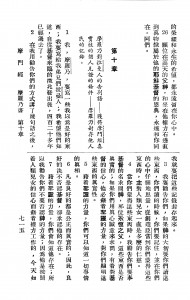Since I have in my possession a first edition copy of the chinese Book of Mormon, I thought it might be fun to compare the original translation with the final version used until 2007 with the newest translation in use today.
I thought the best scripture to start off the comparison was Moroni’s promise in Moroni 10:3-5. As this was the scripture printed in later editions at the front of the book.
Here is the the text from the 1st edition, printed in 1965:
3 我要勸告你們,如果神的大智要你們讀這些東西,你們讀的時候,你們要記住,並在你們的心中仔細地思量,從創造亞當到你們蒙得這些東西時,主對人類兒女一直是多麼的仁慈。
4 當你們蒙得這些東西時,我勸告你們要奉基督的名求問神,那位永恆之父,這些東西是否真實的;如果你們用真心誠意來求問,有著對基督的信心,他必藉著聖靈的力量,對你們顯明這些東西的真實性。
5 藉著聖靈的力量,你們可以知道一切事情的真相。
Here is the text from a circa 2000 edition:
3 我要勸告你們,如果神的大智要你們讀這些,你們讀的時候,你們要記住,並在你們的心中仔細地思量,從創造亞當到你們蒙得這些時,主對人類兒女一直是多麼的慈悲。
4 當你們蒙得這些時,我勸告你們要奉基督的名求問神,那位永恆之父,這些是否真實的;如果你們用真心誠意來求問,有著對基督的信心,他必藉著聖靈的力量,對你們顯明這些事情的真實性。
5 藉著聖靈的力量,你們可以知道一切事情的真實性。
Here is the text in use as of August 2010:
3 看啊,如果神的大智要你們讀這些,我勸告你們在讀的時候,要記住並在心中沉思,從創造亞當到你們蒙得這些時,主對人類兒女一直多麼慈悲。
4 當你們蒙得這些時,我勸告你們要奉基督的名求問神,那位永恆之父,這些是否真實;如果你們用真心誠意來求問,對基督有信心,祂 必藉聖靈的力量,向你們顯明這些事情的真實性。
5 藉著聖靈的力量,你們可以知道一切事情的真實性。
Here is the 1998 Simplified text:
3 如果是神的智慧要你们读这东西,我劝告你们,在读的时候要记住,从创造亚当到你们获得这些东西,主对人类儿女一直是多么的慈悲,你们要仔细思量这些事。
4 我劝告你们在获得这些东西时,要奉基督的名求问神,那位永恒之父,这些东西是否是真实的;如果你们对基督有信心,真心诚意地问,通过圣灵的力量,他把这些事情的真实性向你们显示。
5 侬靠圣灵的力量,你们就可以知道一切事物的真实性。
The first thing that is fun to notice is the fact the word “我要勸告你們” “I want to tell you” was changed to “看啊” “Behold”. This word was apparently one of the more difficult phrases to translate in the original translation. ( See “On Either Side“)
Next is the removal of the word “東西” “thing” from the later editions. I agree this word is unnecessary. Although in verse 5 the original uses the alternative word “事情” and it stayed in later editions. In verse 4 “事情” is used instead of “東西” while in the previous verse it is removed entirely.
The two other small changes from the first edition to the circa 2000 edition are the changes of “仁慈” to “慈悲” and “真相” to “真實性”. A change to the word mercy and truth.
There are quite a few changes in the new translation but the one I think is quite needed is the change from the informal “他” in verse 4 to the more formal “祂” “He meaning God”, which I think is more appropriate.
What do you think of the changes? Does the lastest translation read more correct to the English version?
